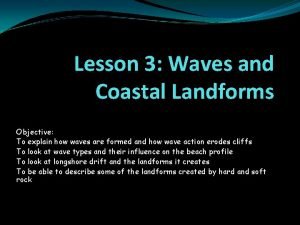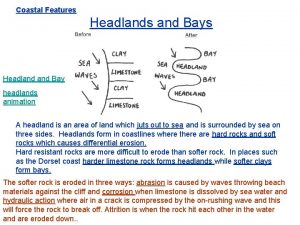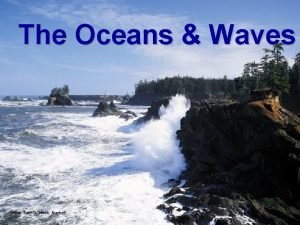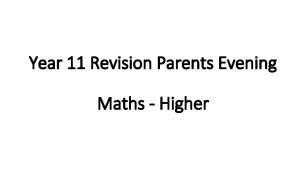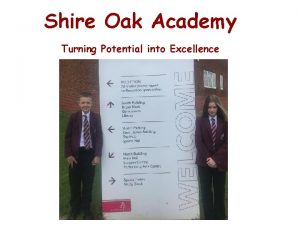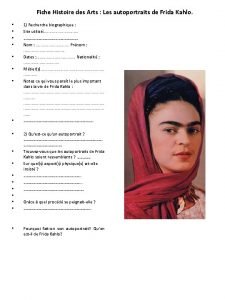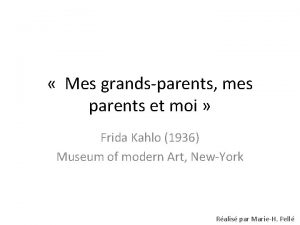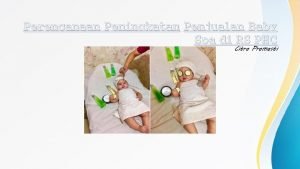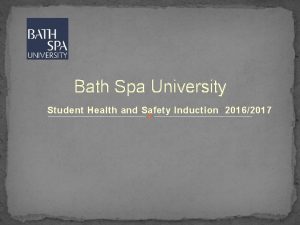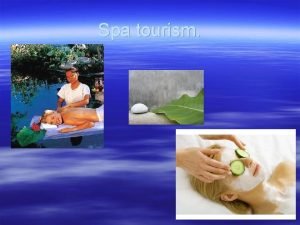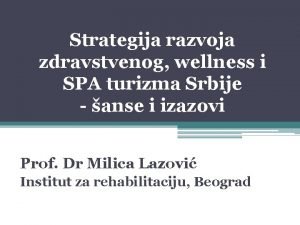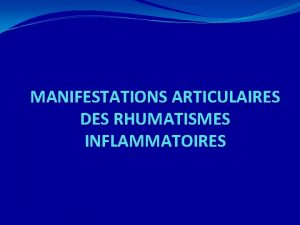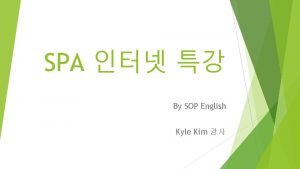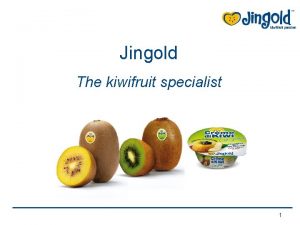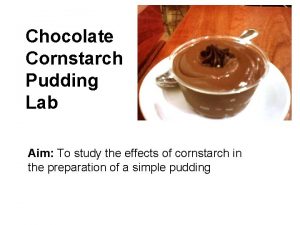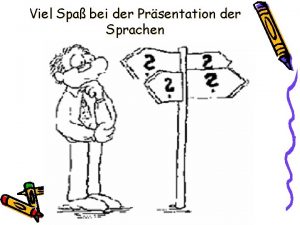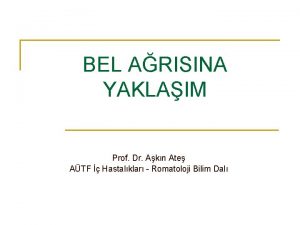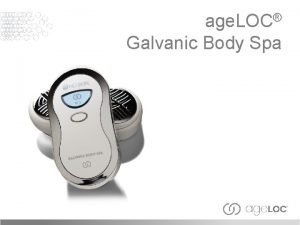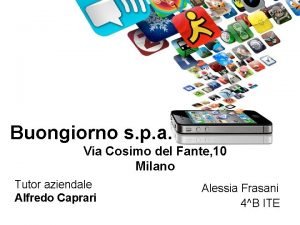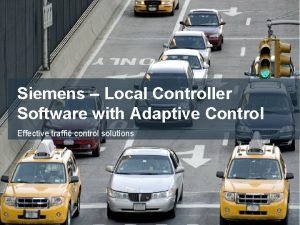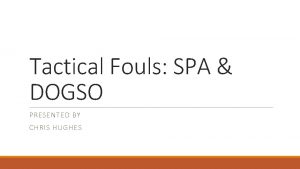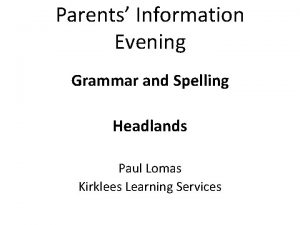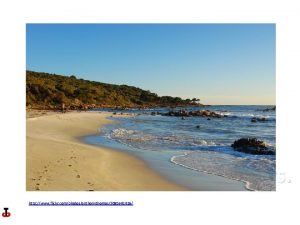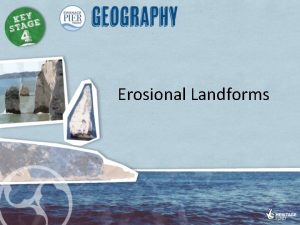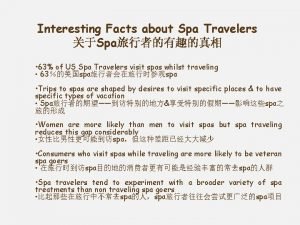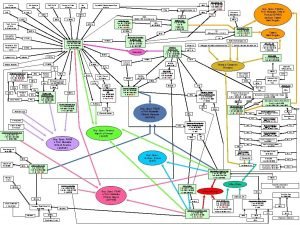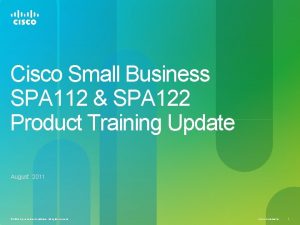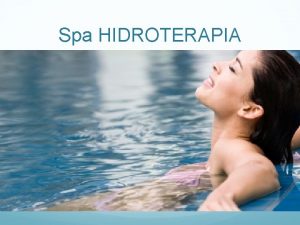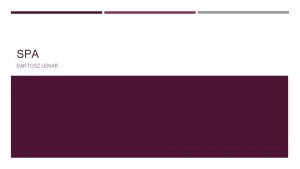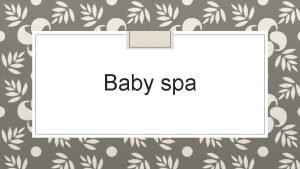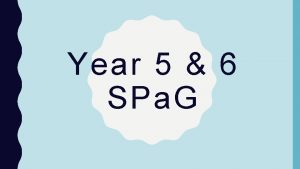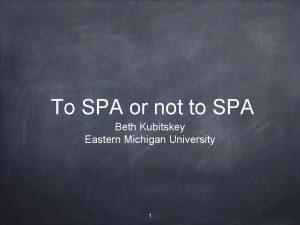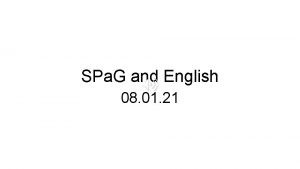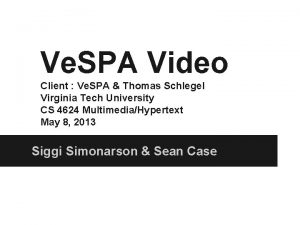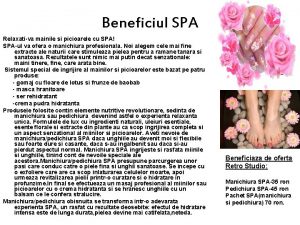Headlands Parents Evening SPa G KS 1 25

































- Slides: 33

Headlands Parents Evening SPa. G KS 1 25. 4. 17 6. 00 p. m.

What is SPa. G? Why the focus? • The English SPa. G test assesses your child’s English skills in: • • –Spelling –Punctuation and –Grammar

What is SPAG? Why the focus? • The Department for Education introduced the test for KS 1 in 2016 and for KS 2 in 2013. This was to make sure that when children leave primary school they were confident in grammar, punctuation and spelling. • The Government wants all children to leave primary school with a sound grasp of essential English skills, ’ ‘The test will put an additional focus on writing skills and encourage good teaching’ (Df. E) • Changes have also been made to GCSEs so that there are marks awarded for spelling, punctuation and grammar in key subjects. • The Df. E have tried to ensure that SPa. G is a key part of teaching at the end of all the major Key Stages

SPa. G at Headlands • This is taught discretely to the children and the children are also taught to understand how to use it in their reading and writing. • By developing a strong understanding of SPa. G children can take control of what and how they write – ensuring they use the elements of grammar and punctuation to create effect in their writing.

Spelling – Key Stage 1 • • • Children are taught phonics as the prime approach to help their reading and writing and spelling. As they progress through KS 1 and school they will also be taught a range of spelling strategies and rules to apply. Common Exception words (Hf. W & Tricky words) will also be taught to the children as these often confuse them Children are provided with word banks to check and correct spellings. Through marking, the identification and correction of spelling errors is individualised for your children. Spelling lists are regularly sent home often linked to the spelling rules and patterns e. g –ly words

Time for a spelling test!!

Let’s have a go! Do you think your child could spell these? ? Ladder Bounces Stories Gentle Pear Sky Flying Office eyes Taken from 2016 English grammar, punctuation and spelling Paper 1: spelling

How can I help? ? • Think about different ways your child can learn their spellings • Put the word/words in a short sentence to write at the end • If you spot the word any where draw their attention to it • Play word/rhyming games • Try to keep it fun!!

Reading into Writing • As a child improves in their reading their spelling will also improve • If a child reads a wide range of books, their vocabulary will expand progress. •

Punctuation • Punctuation is taught directly from Reception onwards to help children to understand when and where it is used. • It helps the reader to make sense of what is written. • It is also incorporated within lessons to provide opportunities for children to apply the skills they have learnt.

Why is it important? • a woman without her man is nothing • A woman, without her man, is nothing. • A woman: without her, man is nothing.

Do I know my punctuation? ? Punctuation mark What is it used for? ‘ (apostrophe) At the end of a sentence or phrase expressing strong emotion Capital Letter To be used in place of a missing letter/letters in a contraction or to show singular possession ! To mark the end of a sentence , (comma) Used at the end of a question sentence ? Used to separate items in a list . To mark the start of a sentence or a proper noun.

Now try it


How can I help? • • • http: //www. funenglishgames. com/punctuation. swf https: //sites. google. com/site/easygrammar 4 kids/make-a-sentence/punctuation http: //www. bbc. co. uk/bitesize/ks 1/literacy/ • When you read to/with your child draw attention to the punctuation. Try reading it with no punctuation and see if they can spot the errors! • Before they read look through the passage/page and spot what punctuation they have to remember as they go through (pick out a few key things)

Why is Grammar important? • Wanted adverts: Two strong, clean youths for sausages. Woman to run up curtains. A room by two gentlemen 30 feet long and 20 feet wide

The most common nonstandard usages in England • Subject–verb agreement (they was… he were…) • Formation of the past tense (have fell, I done) • Formation of negatives (ain’t) • Formation of adverbs (come quick) • Use of demonstrative pronouns (them books) 17

Getting tense? • I fell I have fallen • You took it You have taken it • She did it She has done it • We threw it We have thrown it • You bit it You have bitten it • They saw it They have seen it 18

Word Knowledge Y 1 & 2 Year 1 Year 2 Plural noun suffixes -s / -es e. g. cat - cats / -wish - wisheses Formation of nouns using suffixes such as – ness, –er e. g. hike – hiker happy - happiness Verb suffixes e. g. help changes to helper / helping / helped Formation of adjectives using suffixes such as – ful, –less e. g. beauty – beautiful hopeless The prefix –un and how it changes the meaning e. g. unkind, untie Use of the suffixes –er and –est to form comparisons e. g. big- bigger- biggest Use of –ly to turn adjectives into adverbs -e. g. quick - quickly

Now try it




Sentence Knowledge Year 1 & 2 Year 1 Year 2 Words combine to make sentences Ongoing in Y 2 Joining words and clauses using –and E. g I like crackers and cheese. Use of coordination in sentences using conjunctions: and/ or / but / so and use of subordination in sentence using conjunctions : when/ if/ that/ because Expanded noun phrases e. g. the large dog with a wet nose / the big, strong man Types of sentences: Statements – The dog is barking at the postman. Questions – Can you see the shop? Exclamations – What fun it was! Commands – Run to the end of the road.

Now try it


Text Knowledge Year 1 & 2 Year 1 Year 2 Sequencing sentences to form short narratives Correct choice and consistent use of present tense (-ing -s/-es) and past tense (ed) Use of the progressive form of verbs in the present and past tense to mark actions in progress [for example, she is drumming, he was shouting]

Now try it


Terminology Year 1 & 2 Year 1 Year 2 Letter, capital letter Word, singular, plural Sentence Punctuation, full stop, question mark, exclamation mark Noun, noun phrase Statement, question, exclamation, command Compound, suffix Adjective, adverb, verb Tense (past, present) Apostrophe , comma

How can I help? ? • • • Dan’s Dinosaur is…. . ( good for adjectives) I like/I don’t like (good for conjunction ‘but’) Would you rather? (good for conjunction ’or’) Crazy adverbs Odd one out (good for most word classes) I am thinking of…; (good for sentence development, description and various word classes)

So why do we need all this?

Any questions? ?
 Bays and headlands
Bays and headlands Internal wave
Internal wave Headland and bays
Headland and bays Ooze
Ooze Parents evening apostrophe
Parents evening apostrophe Greysbrooke parents evening
Greysbrooke parents evening Bushey meads parents evening
Bushey meads parents evening Shire oak parents evening
Shire oak parents evening Parents parents
Parents parents Frida kahlo famille arbre généalogique
Frida kahlo famille arbre généalogique Frida kahlo mes parents mes grands parents et moi
Frida kahlo mes parents mes grands parents et moi Promosi baby spa
Promosi baby spa Bali relaxing resort and spa
Bali relaxing resort and spa Bath spa university security number
Bath spa university security number The golden spa
The golden spa Explain the meaning of spa in tourism
Explain the meaning of spa in tourism Strategija razvoja turizma srbije
Strategija razvoja turizma srbije Peter zumthor thermal baths
Peter zumthor thermal baths Dsv castel san giovanni
Dsv castel san giovanni Efica spa
Efica spa Kim
Kim Softuni angular
Softuni angular Dpa testing
Dpa testing Jingold spa
Jingold spa Pudding lab
Pudding lab Nasus
Nasus Galvanic body spa benefits
Galvanic body spa benefits Intermalleolar mesafe
Intermalleolar mesafe Galvanic body spa funciona realmente
Galvanic body spa funciona realmente How does the galvanic body spa work
How does the galvanic body spa work Buongiorno spa
Buongiorno spa Siemens sepac
Siemens sepac Spa schema riassuntivo
Spa schema riassuntivo Dogso e spa
Dogso e spa
